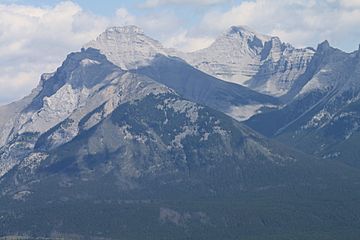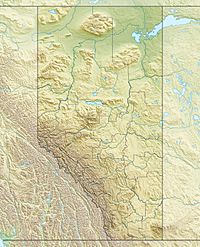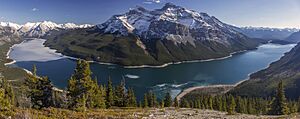Mount Girouard facts for kids
Quick facts for kids Mount Girouard |
|
|---|---|

Mount Inglismaldie (left) and Mount Girouard (right)
|
|
| Highest point | |
| Elevation | 2,995 m (9,826 ft) |
| Prominence | 1,455 m (4,774 ft) |
| Listing | List of mountains of Alberta |
| Geography | |
| Location | Alberta, Canada |
| Parent range | Fairholme Range |
| Topo map | NTS 82O/03 |
| Climbing | |
| First ascent | 1938 by E.E. Bishop and D.R. Crosby |
| Easiest route | rock climb |
Mount Girouard is a tall mountain peak found in Banff National Park in Alberta, Canada. It's the highest point in the Fairholme Range. This impressive mountain stands in the Bow River valley, just south of the beautiful Lake Minnewanka.
Contents
Why is it Called Mount Girouard?
The mountain received its name in 1904. It was named after Sir Édouard Girouard. He was an important person who helped build railways in Africa when the British Empire was very powerful.
What is Mount Girouard Made Of?
Mount Girouard is made up of different types of sedimentary rock. This rock formed over millions of years, from the Precambrian to the Jurassic periods. Imagine tiny bits of sand, mud, and shells settling at the bottom of ancient, shallow seas. Over time, these layers hardened into rock.
How Did the Rock Form?
Millions of years ago, these rocks were laid down in shallow seas. Later, during a time called the Laramide orogeny, huge forces pushed the Earth's crust. This caused the older sedimentary rock to move east and slide on top of younger rock layers. This process created the towering mountains we see today.
What is the Climate Like at Mount Girouard?
Mount Girouard has a subarctic climate. This means it has very cold, snowy winters. The summers are usually mild.
Temperatures and Weather
In winter, temperatures can drop below −20 degrees Celsius (which is −4 degrees Fahrenheit). With the wind chill, it can feel even colder, sometimes below −30 degrees Celsius (−22 degrees Fahrenheit). All the rain and melted snow from the mountain flow into the Bow River.
 | Isaac Myers |
 | D. Hamilton Jackson |
 | A. Philip Randolph |



